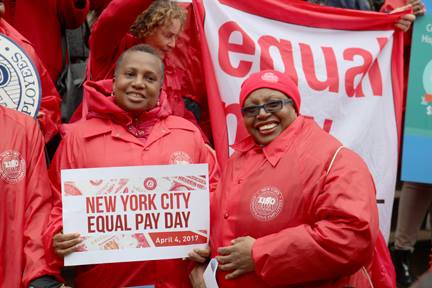This post was written by Arthur Cheliotes from CWA 1180, as part of our PowHer the Vote 2017 campaign.
Election day is upon us with its usual barrage of mailers, television, social media and radio ads asking us to vote for ‘their’ candidate. But is ‘their’ candidate the best candidate for our economic, social and political concerns?
In most districts, if you waited until November to choose and didn’t vote in the primary election in September, you probably missed the boat. So you wonder if my vote will make a difference?
Yes, your vote will make a difference, but not for the reasons you might think. Consider that the real decision in districts where one party dominates happens in the primary election not the general. If you want to act strategically to influence elected officials and public policy, you must register in the dominant political party in your neighborhood. If you find the political club doesn’t share your views organize those who do and mobilize them to achieve your goals. Remember what Margaret Mead said, “Never doubt that a small group of thoughtful, committed citizens can change the world; indeed, it’s the only thing that ever has.”
In politics being a thoughtful and committed citizen means you must vote in all elections so public voting records show that you are a regular voter. Candidates pay attention since very few eligible voters actually bother to vote. Therefore, you have more political power than most of your neighbors. You are what campaign managers refer to as a triple prime voter, someone who votes in presidential elections, state and local elections and primary elections. Campaigns will ignore dozens of registered voters who only vote in presidential elections to address the issues of concern of a triple prime voter. You are someone to which attention must be paid!
In our struggle for social, political and economic justice, the labor movement and Local 1180 in particular are demanding the enforcement of equal pay and racial discrimination laws. In New York State, the majority of union members are women. Local 1180’s membership is overwhelmingly women and minorities working for city government agencies. Yet 50 years after the passage of the civil rights act and the equal pay act the Bloomberg administration paid former managers who were women and minorities less than men doing the same work. After a 10-year struggle, most women and minorities who were Administrative Mangers were finally permitted to join our union.
After an initial analysis, the union filed a complaint and after a number of years won a $243 million determination from the Federal EEOC against the Bloomberg administration. The Federal court is now reviewing a proposed settlement with the de Blasio administration. The settlement would not have been possible if we had not elected a progressive administration that shared our views. We would have been tied up in the courts for a decade if the union hadn’t organized and mobilized our members to vote.
We know that racial and gender discrimination are so pervasive in our culture they are accepted as normal. Therefore, our next challenge is making systemic changes so discrimination laws are enforced. You can only fight discrimination if you know where it exists. The union proposed legislation that modified the current law, which mandates publishing the names and wages of every city worker by simply adding their gender and race. If the data shows that wages are discriminatory, the city must explain why or develop ways to correct it. Otherwise, they might face EEO charges. We were able to convince 43 out of 51 City Council Members to be co-sponsors of this legislation known as Intro. 1536.
Local 1180 did this by again organizing and mobilizing members but this time in their neighborhoods. We established community councils in each borough where members met to discuss issues such as zoning and gentrification, schools and policing, in addition to work issues. We encouraged meetings in City Council members’ neighborhood offices to make clear that our members are their constituents, registered in their political party, many are members of their local political clubs, some are triple prime voters, and all are organized in the union. Members explained why we needed systemic changes to identify discrimination against women and minorities proposed in our legislation. We asked City Council Members to be co-sponsors. The City Council Members and their staffs listened attentively, and signed on as co-sponsors of Intro. 1536.
Our union organized and mobilized our members to demand more than just rhetoric from our public officials, we demanded the tools to identify and enforce equal pay and racial discrimination laws. We are pushing for passage of Intro. 1536 by the end of the year as we pursue justice for all.
The union builds the political power of ‘a small group of thoughtful, committed citizens’.


